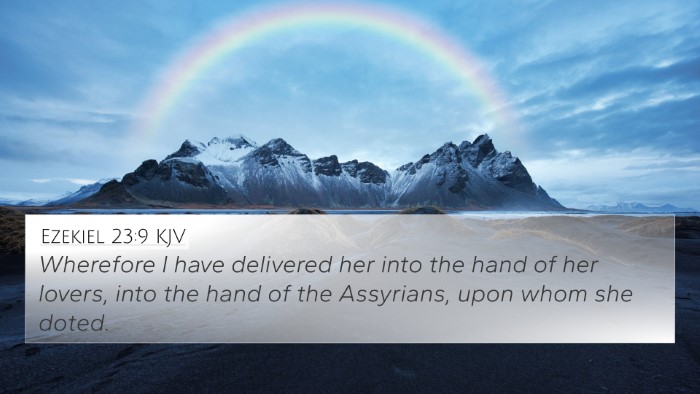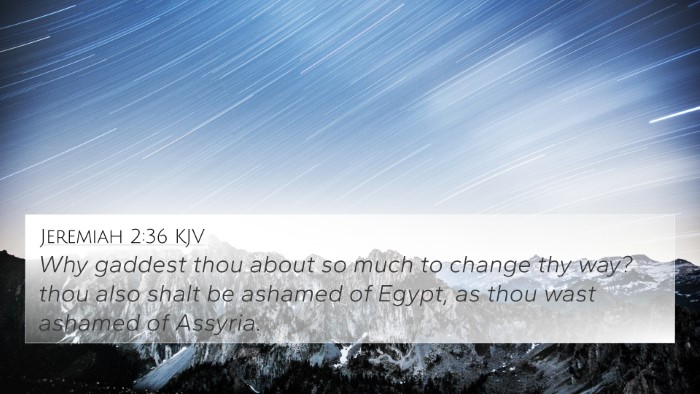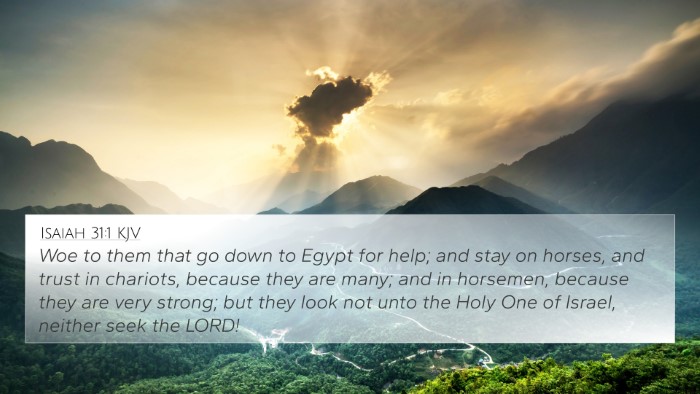Meaning and Interpretation of Jeremiah 22:20
Verse: "Go up to Lebanon, and cry; and lift up thy voice in Bashan, and cry from the passages: for all thy lovers are destroyed."
Overview
Jeremiah 22:20 serves as a poignant appeal from the prophet Jeremiah, emphasizing the desolation that the people of Judah face due to their disobedience and reliance on foreign nations instead of Yahweh. This verse embodies a tone of lamentation, urging the audience to recognize the repercussions of their spiritual infidelity.
Interpretation from Different Commentaries
Matthew Henry's Commentary
Henry presents this verse as a prophetic warning concerning the fate of Judah's alliances with foreign nations. The reference to "Lebanon" and "Bashan" signifies the strength and majesty of the places where lament is called for, highlighting that even the most formidable nations can face destruction due to their sinfulness and idolatry. His interpretation emphasizes the futility of seeking help from allies rather than turning to God.
Albert Barnes' Commentary
Barnes expands on the geographic references in this verse, suggesting they symbolize the heights of former glory and security. He argues that the command to "cry" signifies an urgent need for repentance. The phrase "for all thy lovers are destroyed" reflects the inevitability of the judgment that comes when one places trust in mortal powers instead of in God.
Adam Clarke's Commentary
Clarke discusses the context of Jeremiah's prophecy, addressing the devastation that will come upon Judah due to their failure to heed divine warnings. His interpretation underscores the emotional depth of the lament urged by Jeremiah, indicating that the destruction of Judah’s trusted allies was imminent, drawing a parallel to the broader theme of divine retribution observed throughout the prophetic literature.
Thematic Bible Verse Connections
Jeremiah 22:20 connects with various themes throughout the Bible. Notable cross-references include:
- Isaiah 30:3 - "Therefore shall the strength of Pharaoh be your shame, and the trust in the shadow of Egypt your confusion."
- Hosea 8:9 - "For they are gone up to Assyria, a wild ass alone by himself: Ephraim hath hired lovers."
- Jeremiah 2:36 - "Why gaddest thou about so much to change thy way? thou also shalt be ashamed of Egypt, as thou wast ashamed of Assyria."
- Psalm 146:3 - "Put not your trust in princes, nor in the son of man, in whom there is no help."
- Ezekiel 16:28 - "Thou hast played the whore also with the Assyrians, because thou wast insatiable; yea, thou hast played the harlot with them, and yet couldst not be satisfied."
- Proverbs 21:30 - "There is no wisdom nor understanding nor counsel against the Lord."
- Micah 5:10 - "And it shall come to pass in that day, saith the Lord, that I will cut off thy horses out of the midst of thee, and I will destroy thy chariots."
Understanding Emotional and Spiritual Themes
This verse also touches on profound emotional themes, including:
- Despair: The lamentation indicated by the command to cry illustrates the pain and hopelessness resulting from broken alliances and trust.
- Judgment: The destruction of "lovers" (foreign allies) symbolizes God’s judgment on those who turn away from Him.
- Repentance: Jeremiah’s call to lament suggests the need for introspection and repentance as a theme in reclaiming one’s relationship with God.
Cross-Referencing Biblical Texts for Deeper Understanding
Considering cross-references enhances the understanding of themes prevalent in this verse. Tools for Bible cross-referencing such as Bible concordances or cross-reference guides can aid in identifying these connections. Here are some suggestions:
- Utilize a Bible concordance to locate verses related to trust and judgment.
- Refer to a Bible cross-reference guide for connections between the prophetic texts and other parts of scripture.
- Engage in cross-reference Bible study to derive thematic insights across different biblical contexts.
Conclusion
Jeremiah 22:20 encapsulates a profound message of judgment and warning for those who misplace their trust. By cross-referencing biblical texts and employing effective study methods, one can unearth the interconnectedness of scriptural themes. The study of this verse opens avenues for deeper understanding of God's call for fidelity, the consequences of idolatry, and the overarching narrative of redemption woven throughout the scriptures.


















